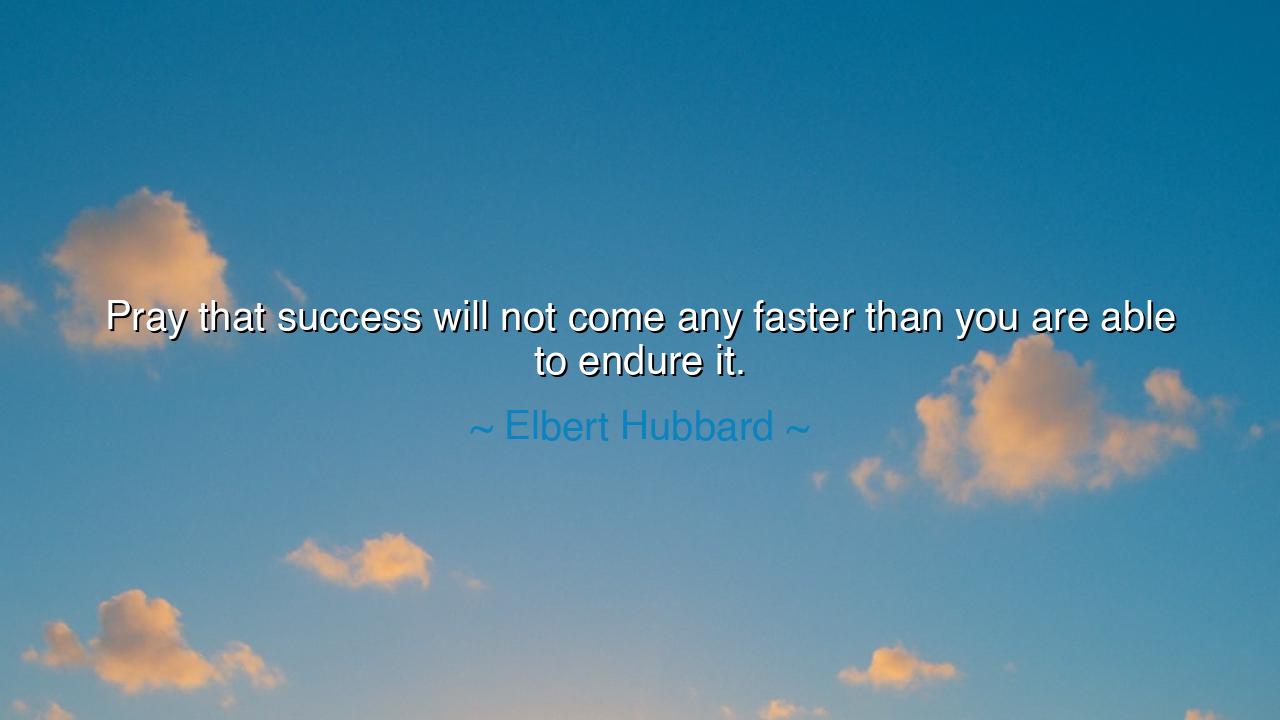
Pray that success will not come any faster than you are able to






The words of Elbert Hubbard strike like a quiet warning wrapped in wisdom: “Pray that success will not come any faster than you are able to endure it.” In this sentence lies the recognition that while men and women long for success, not all are prepared to carry its weight. For though success may glitter with promise, it is also a burden, heavy as a crown of iron. To gain it too swiftly, without the strength to bear it, is to risk collapse. Thus Hubbard teaches us to seek not only the prize, but the endurance to sustain it.
The origin of this truth comes from a man who lived as a craftsman, philosopher, and reformer in the early days of America’s industrial growth. Hubbard saw the rise of ambition all around him, and he knew that prosperity gained too quickly often led to ruin. His words echo the voice of experience: success is not merely achievement, but the ability to hold fast under its pressures—fame, envy, responsibility, and temptation. The swift rise can become the swift fall if the soul has not been tempered.
History offers many examples. Consider the tale of Alexander the Great. By thirty years of age, he had conquered much of the known world. Yet his success came faster than his spirit could endure. His empire fragmented after his death, for his armies were loyal to him but unprepared for succession. His victories were dazzling, but the speed of their coming allowed no time for roots to grow. Thus the lesson: success without endurance is like a flame that blazes bright but soon burns out.
Another tale may be found in the world of art. Vincent van Gogh, though a genius, longed for recognition that never came in life. One might say his lack of success was a tragedy. Yet in truth, his slow struggle forged works of depth and soul. Had success come too swiftly, perhaps he would not have pushed so deeply into the well of his spirit. His endurance, though marked by suffering, left treasures for generations. Here we see the paradox: it is not only success that defines greatness, but the ability to endure its presence—or its absence.
The wisdom of Hubbard’s saying is deeply practical. It reminds us that life is not a race to the summit, but a pilgrimage of preparation. To pray that success not come too soon is to pray for patience, for growth, for the strength to hold fast when it finally arrives. For when success does come, it tests as much as it blesses. Wealth tests generosity, power tests humility, fame tests integrity. Without endurance, the blessings turn to curses.
The lesson, then, is clear: seek first to become strong within before you long for triumph without. Build the muscles of character, the bones of discipline, the breath of patience. When success comes—whether in career, in love, in art—you will then be able not only to receive it, but to sustain it. Endurance makes success lasting; without endurance, it devours the one who holds it.
Practically, this means embracing slow growth. Do not despise the seasons of waiting, for they are training the soul. Set goals that stretch you, but do not demand victory before its time. When opportunities come, ask not only, “Do I want this?” but also, “Am I strong enough to bear it?” In this way, you align with the wisdom of Hubbard, and your success will not destroy you, but become a crown you can truly wear.
Thus remember: “Pray that success will not come any faster than you are able to endure it.” These are not words of fear, but of wisdom. Endure first, and then succeed. Grow first, and then rise. For the mountain peak is only safe for those whose legs have been trained by the climb.






AAdministratorAdministrator
Welcome, honored guests. Please leave a comment, we will respond soon